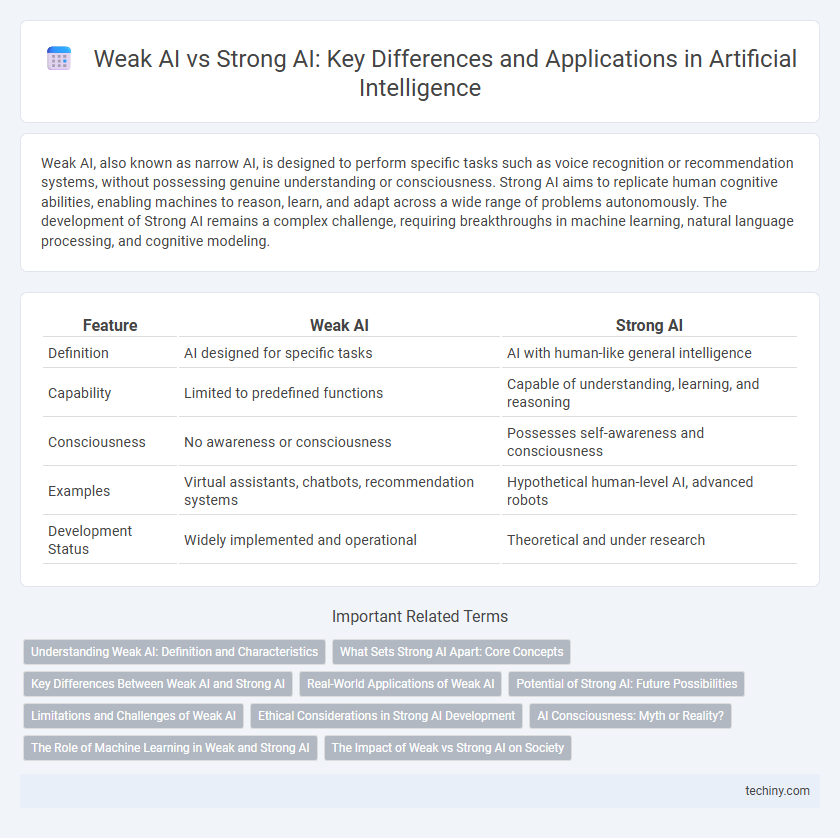Weak AI, also known as narrow AI, is designed to perform specific tasks such as voice recognition or recommendation systems, without possessing genuine understanding or consciousness. Strong AI aims to replicate human cognitive abilities, enabling machines to reason, learn, and adapt across a wide range of problems autonomously. The development of Strong AI remains a complex challenge, requiring breakthroughs in machine learning, natural language processing, and cognitive modeling.
Table of Comparison
| Feature | Weak AI | Strong AI |
|---|---|---|
| Definition | AI designed for specific tasks | AI with human-like general intelligence |
| Capability | Limited to predefined functions | Capable of understanding, learning, and reasoning |
| Consciousness | No awareness or consciousness | Possesses self-awareness and consciousness |
| Examples | Virtual assistants, chatbots, recommendation systems | Hypothetical human-level AI, advanced robots |
| Development Status | Widely implemented and operational | Theoretical and under research |
Understanding Weak AI: Definition and Characteristics
Weak AI, also known as Narrow AI, refers to artificial intelligence systems designed to perform specific tasks without genuine understanding or consciousness. These systems operate within predefined boundaries and excel at pattern recognition, data analysis, and task automation but lack self-awareness or true cognitive abilities. Examples of Weak AI include virtual assistants like Siri, recommendation algorithms, and image recognition software.
What Sets Strong AI Apart: Core Concepts
Strong AI distinguishes itself through artificial general intelligence (AGI), possessing the ability to understand, learn, and apply knowledge across diverse tasks indistinguishably from human cognition. Unlike Weak AI, which operates under narrow, task-specific algorithms, Strong AI aims for consciousness, reasoning, and self-awareness, enabling autonomous decision-making in unpredictable environments. Core concepts include cognitive architectures, neural-symbolic integration, and adaptive learning systems designed to replicate human-like understanding and problem-solving capabilities comprehensively.
Key Differences Between Weak AI and Strong AI
Weak AI, also known as Narrow AI, is designed to perform specific tasks and operates within limited, predefined parameters, lacking self-awareness or genuine understanding. Strong AI, or Artificial General Intelligence (AGI), possesses the ability to understand, learn, and apply knowledge across diverse domains, exhibiting human-like cognitive functions and consciousness. The key differences lie in their scope, adaptability, and level of intelligence--Weak AI excels in task-specific applications, whereas Strong AI aims for autonomous reasoning and broad intellectual capability.
Real-World Applications of Weak AI
Weak AI powers virtual assistants like Siri and Alexa, enabling natural language processing and voice recognition for everyday user interactions. It drives recommendation algorithms in platforms such as Netflix and Amazon, personalizing content based on user behavior and preferences. Weak AI also supports autonomous vehicles by processing sensor data to perform specific driving tasks without human intervention.
Potential of Strong AI: Future Possibilities
Strong AI, also known as Artificial General Intelligence (AGI), holds the potential to perform any intellectual task that a human can achieve, enabling machines to understand, learn, and apply knowledge across diverse domains. Unlike Weak AI, which is designed for specific tasks and lacks genuine understanding, Strong AI aims for autonomous reasoning, creativity, and emotional intelligence, paving the way for transformative advancements in healthcare, education, and robotics. The development of Strong AI could revolutionize problem-solving capabilities and foster unprecedented innovation in technology and society.
Limitations and Challenges of Weak AI
Weak AI systems excel at narrow tasks but face significant limitations in understanding context and exhibiting genuine intelligence or self-awareness. These systems lack the ability to learn and generalize beyond predefined data, resulting in challenges such as rigidity, dependence on human input, and vulnerability to unexpected scenarios. The gap between weak AI's task-specific capabilities and the adaptive reasoning required for real-world problem-solving highlights the critical challenges in advancing toward strong AI.
Ethical Considerations in Strong AI Development
Strong AI development raises critical ethical considerations including accountability, decision-making transparency, and the potential for autonomous actions that impact human rights. Ensuring robust governance frameworks and ethical guidelines is essential to prevent misuse and unintended consequences. Prioritizing human-centric design and continuous ethical assessment can mitigate risks associated with deploying advanced autonomous systems.
AI Consciousness: Myth or Reality?
Weak AI operates within predefined parameters, lacking genuine consciousness or self-awareness, serving as sophisticated tools for specific tasks. Strong AI aims to achieve true cognitive understanding and consciousness comparable to human minds, enabling autonomous reasoning and emotional experiences. The quest for AI consciousness remains a controversial debate, with most experts considering it a theoretical concept rather than an imminent reality.
The Role of Machine Learning in Weak and Strong AI
Machine learning serves as the foundation of Weak AI by enabling systems to perform specific tasks through pattern recognition and data-driven decision-making without genuine understanding. In Strong AI, machine learning aims to replicate human-like cognition, allowing machines to reason, learn autonomously, and adapt across diverse domains. The contrast lies in Weak AI's task-specific algorithms versus Strong AI's pursuit of general intelligence through advanced machine learning models.
The Impact of Weak vs Strong AI on Society
Weak AI, designed for specific tasks, currently drives innovations in automation, healthcare diagnostics, and customer service, enhancing efficiency and accessibility. Strong AI, with human-like cognitive abilities, promises transformative societal shifts, including ethical challenges and profound changes in employment structures. The societal impact of Strong AI could be vastly greater, necessitating careful governance to balance benefits and risks.
Weak AI vs Strong AI Infographic

 techiny.com
techiny.com